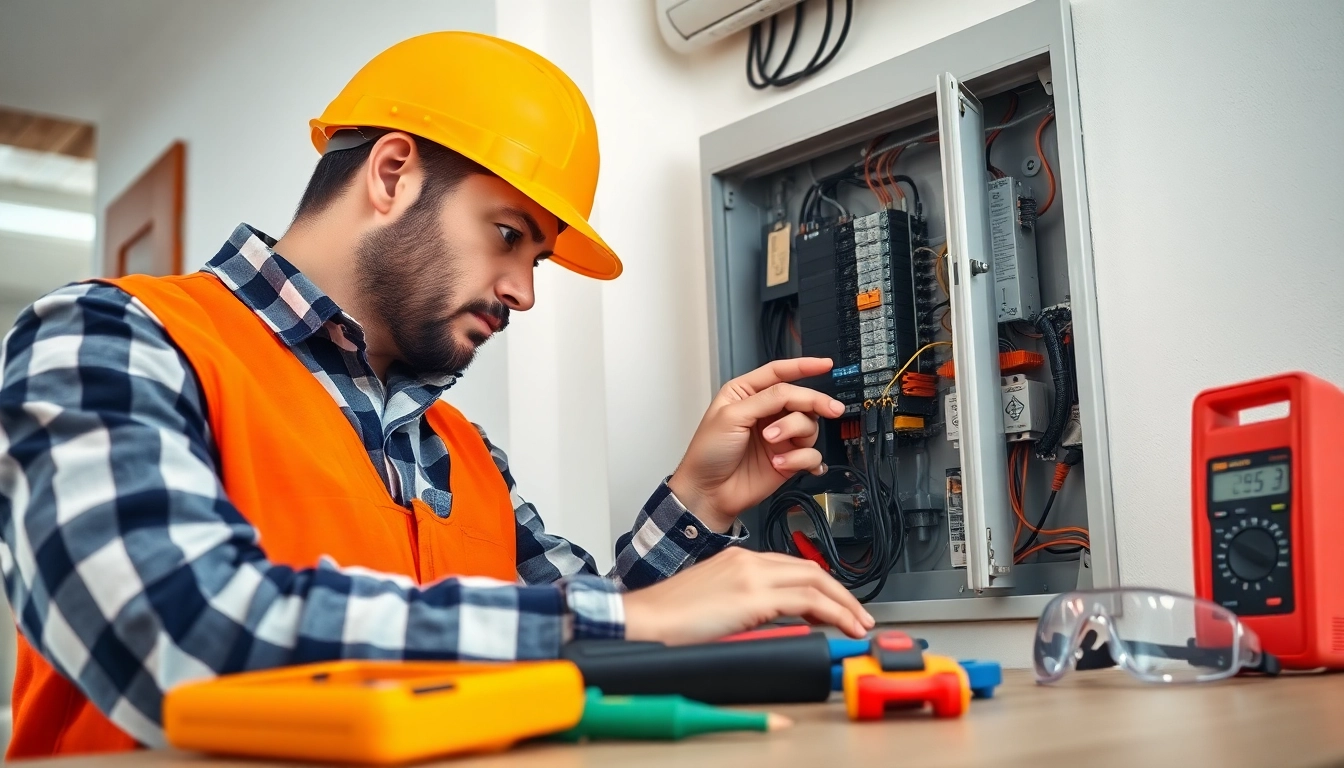Understanding the Importance of Professional Electrical Service
Electrical systems are an essential part of modern life, fueling our homes, offices, and industries. Whether you’re flicking a light switch, powering up your computer, or running a crucial piece of manufacturing equipment, electricity plays a pivotal role. Given its significance, understanding Electrical Service is vital for both safety and functionality. This article delves into the various facets of electrical services, emphasizing the necessity of hiring professionals, the types of services available, scheduling processes, cost considerations, and safety maintenance.
What is Electrical Service?
Electrical service encompasses a range of tasks performed by certified electricians that ensure the proper functioning of electrical systems. This includes installation, repair, inspection, and maintenance of electrical wiring, circuit breakers, outlets, and other components. In essence, electrical service is about ensuring that all electrical systems operate safely and efficiently, conforming to local codes and regulations. This is crucial not only for performance but also for preventing potentially hazardous situations, such as electrical fires or shocks.
Why You Should Hire Certified Electricians
Hiring certified electricians is not just a matter of preference; it is a necessity for safety and reliability. Certified electricians undergo extensive training and education, resulting in a deep understanding of electrical systems and safety protocols. Moreover, they are familiar with building codes and regulations, which helps in avoiding fines associated with non-compliance. The complexities involved in electrical work—such as understanding load calculations, reading blueprints, and managing wiring installations—require professional expertise. Attempting to handle electrical issues without proper training can lead to inadequate work, safety hazards, and significant expenses in the long run.
Common Misconceptions About Electrical Work
There are many misconceptions about electrical work that can lead homeowners and business owners to take unnecessary risks. One common myth is that all electrical work is the same. In reality, electrical systems vary significantly between residential, commercial, and industrial settings. Another misconception is that DIY electrical work is always a feasible option to save money. However, without expert knowledge, DIY attempts can result in substandard installations, increased energy costs, and safety hazards. Understanding these misconceptions is crucial for making informed decisions regarding electrical services.
Types of Electrical Services Offered
Residential Electrical Services
Residential electrical services cater to homeowners and include a wide range of tasks such as wiring installations, servicing electrical panels, outlet installations, and troubleshooting electrical issues. Common residential services include:
- Electrical panel upgrades
- Lighting installations and repairs
- Outlet and switch installations
- Smoke detector and carbon monoxide detector installations
- Wiring for new construction or renovations
Each of these services is critical to ensuring that the home stays powered safely and efficiently. A well-designed residential electrical system not only adds comfort but also enhances the overall value of the property.
Commercial Electrical Services
Commercial electrical services are tailored to businesses and institutions, which often have more complex electrical needs than residential properties. This may include installations for large-scale lighting systems, backup generators, and sophisticated electrical distribution systems. Commercial services typically involve:
- Energy-efficient lighting solutions
- Electrical safety inspections
- Wiring and installation of heating, ventilation, and air conditioning (HVAC) systems
- Upgrade services for electrical panels and circuit breakers
- Fire alarm systems installation and maintenance
Businesses rely on well-functioning electrical systems to maintain operations, enhance safety, and maximize productivity.
Emergency Electrical Services
Electrical emergencies can arise without warning, posing safety risks to both residential and commercial properties. Emergency electrical services provide immediate assistance for issues such as:
- Poor circuit performance or power outages
- Fires caused by electrical faults
- Flickering lights or burning smells from outlets
- Short circuits and blown fuses
These services are available 24/7 and are designed to restore power quickly while adhering to safety standards. Prompt intervention can prevent further damage and safeguard occupants.
The Process of Scheduling Electrical Services
Initial Consultation and Assessment
The first step in scheduling electrical services typically involves an initial consultation and assessment. This includes evaluating existing electrical systems, identifying issues, and discussing the needs of the homeowner or business owner. Electricians may ask questions regarding any recent electrical issues, specific requirements for installations, or future electrical needs. This process is crucial for creating a tailored approach to meet client needs.
Generating Detailed Service Estimates
Once the assessment is complete, electricians will provide a detailed service estimate. This document outlines the scope of work, materials needed, and the associated costs. It serves as a commitment to transparent pricing and helps clients make informed decisions. It’s also advisable to request estimates from multiple service providers to compare prices and services offered.
Understanding the Timeline for Completion
Understanding the timeline for completing electrical work is also essential. Clients should discuss how long the job will take and any potential delays, such as obtaining permits or availability of materials. By having realistic timelines, clients can make necessary arrangements for their homes or businesses.
Cost Considerations for Electrical Services
Factors Influencing Electrical Service Pricing
The costs associated with electrical services can vary significantly based on several factors. Key elements that influence pricing include:
- The complexity of the job—simple repairs are far less costly than complete rewiring.
- Materials and equipment needed for the job, including the quality of products used.
- Location—service rates may be higher in urban areas due to increased operating costs.
- The experience level of the electrician or service company, as more experienced professionals may charge accordingly.
- Permitting and inspection fees, which may be required for some electrical work.
Comparing Service Costs Across Providers
When considering electrical services, it is prudent to collect estimates from multiple service providers. This enables homeowners and business owners to compare costs and service offerings. While price is an important factor, it’s also wise to consider the reputation and experience of the electricians involved. Opting for the cheapest service could lead to subpar work, whereas finding a balance between quality and cost is essential.
Budget-Friendly Tips for Homeowners
Homeowners can take several measures to manage and reduce electrical service costs. Some budget-friendly tips include:
- Conducting regular maintenance checks to prevent larger, costlier repairs.
- Being proactive in addressing small electrical issues before they escalate.
- Using energy-efficient appliances and systems to lower energy costs in the long run.
- Considering home improvement projects that enhance electrical efficiency, such as installing LED lighting.
Ensuring Safety with Electrical Service Maintenance
Regular Electrical Inspections
One of the best ways to ensure safety in any electrical system is through regular inspections. Professional electricians can evaluate systems for safety hazards, such as outdated wiring, improper grounding, and overloaded circuits. Scheduling routine inspections can help catch potential problems early, avoiding costly repairs or dangerous situations.
Common Electrical Hazards and How to Avoid Them
Understanding common electrical hazards is crucial for safety. Some prevalent issues include:
- Overloaded circuits, which can lead to fires.
- Faulty wiring that can cause shocks and malfunctions.
- Moisture in electrical components, particularly in areas like bathrooms and kitchens.
To avoid these hazards, homeowners and business owners should ensure that all electrical installations are performed by qualified professionals and adhere to local codes. Installing ground fault circuit interrupters (GFCIs) in potentially wet areas is another effective precaution.
Upgrading Electrical Systems for Improved Safety
Upgrading electrical systems is essential for maintaining safety and efficiency. Older homes might have electrical systems that can’t support modern-day energy demands. This makes electrical upgrades not only a necessary consideration for safety but also essential for ensuring functionality as new technology is integrated. Common upgrades include installing additional outlets, upgrading to a higher amp service, and replacing old wiring that may no longer be safe.
In conclusion, the importance of professional electrical services cannot be overstated. Understanding the various services available, the process of engaging those services, and the necessary precautions for safety ensures that both residential and commercial properties can thrive in a securely powered environment. Emerging standards and technologies in the field of electrical services continue to evolve, emphasizing the need for qualified professionals to deliver the best possible outcomes.



